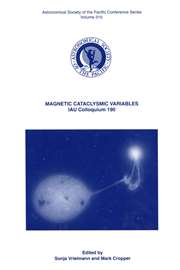Article contents
Rotating Progenitors of the Wolf-Rayet Binaries HD186943 and HD90657
Published online by Cambridge University Press: 22 February 2018
Extract
We present rotating progenitor models for the WR+O binary systems HD186943 and HD90657 (van der Hucht, 2001) calculated with the evolutionary code described by Wellstein (2001). Due to rotation, the effective accretion onto the secondary star is reduced as it is spun-up close to its break-up velocity and thereby undergoes strong mass loss. We investigate the progenitor evolution of the two observed WR+O binary systems through stable mass transfer. We conclude that these systems evolved through Case A mass transfer as they have short orbital periods now (8…10 days), and the progenitor systems must have started with a shorter or equal period. We show that there has to be a significant mass loss from the binary system to produce WR+O systems similar to the observed ones. The accretion efficiency of the secondary star in our rotating models is ~10%. We compare properties of the observed and modelled systems in Table 1.
- Type
- The Contributed Papers
- Information
- Copyright
- Copyright © Instituto de astronomia/revista mexicana de astronomίa y astrofίsica 2004
References
- 1
- Cited by


